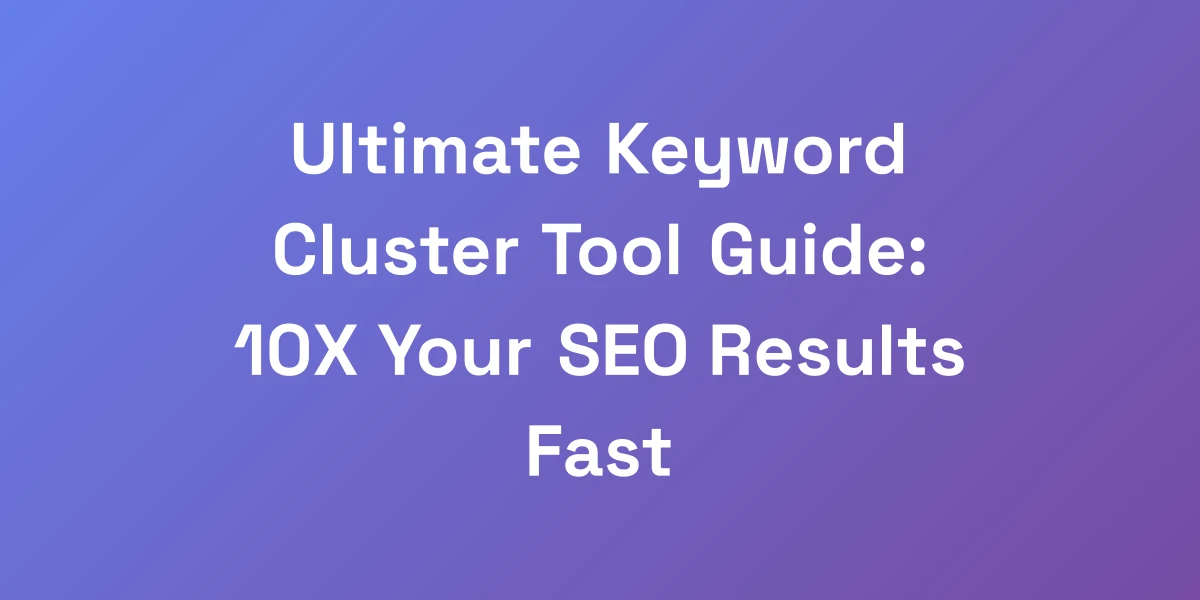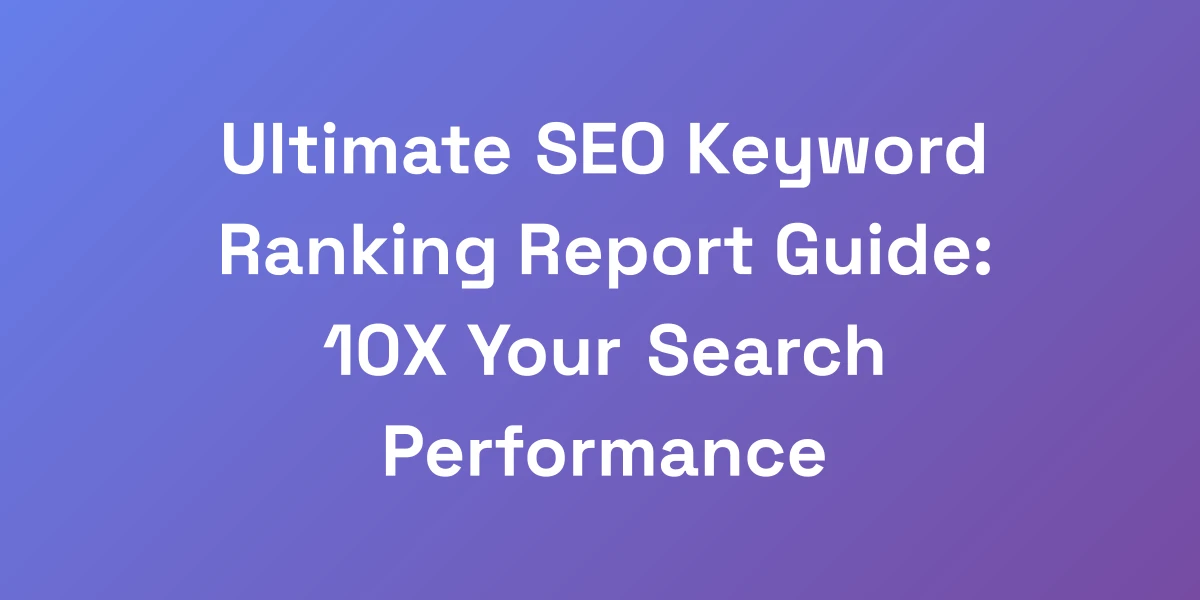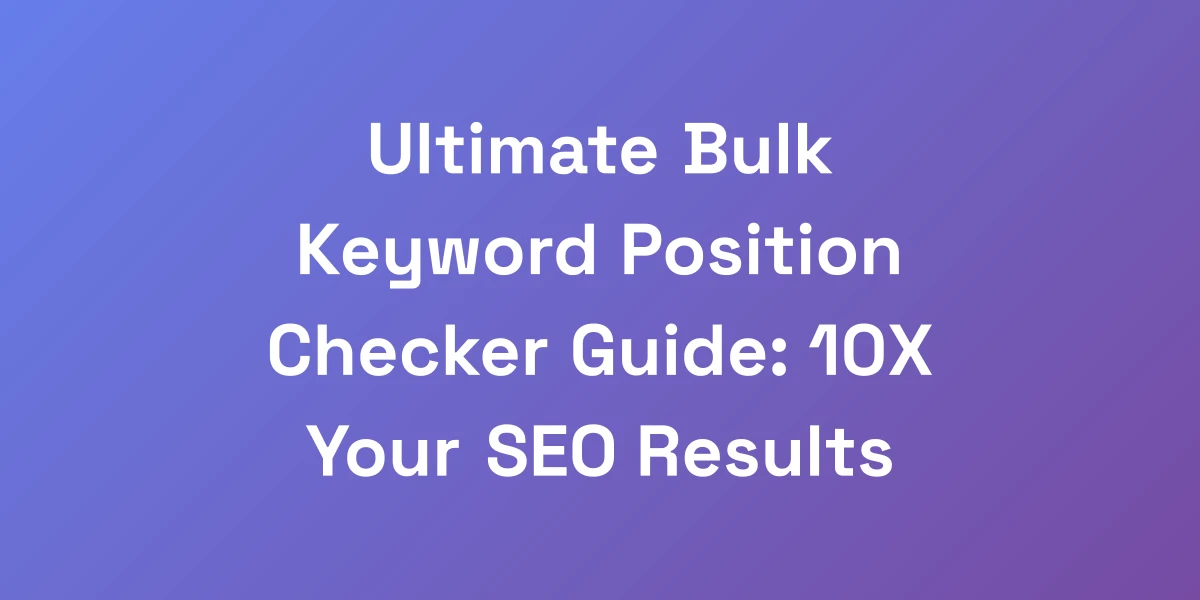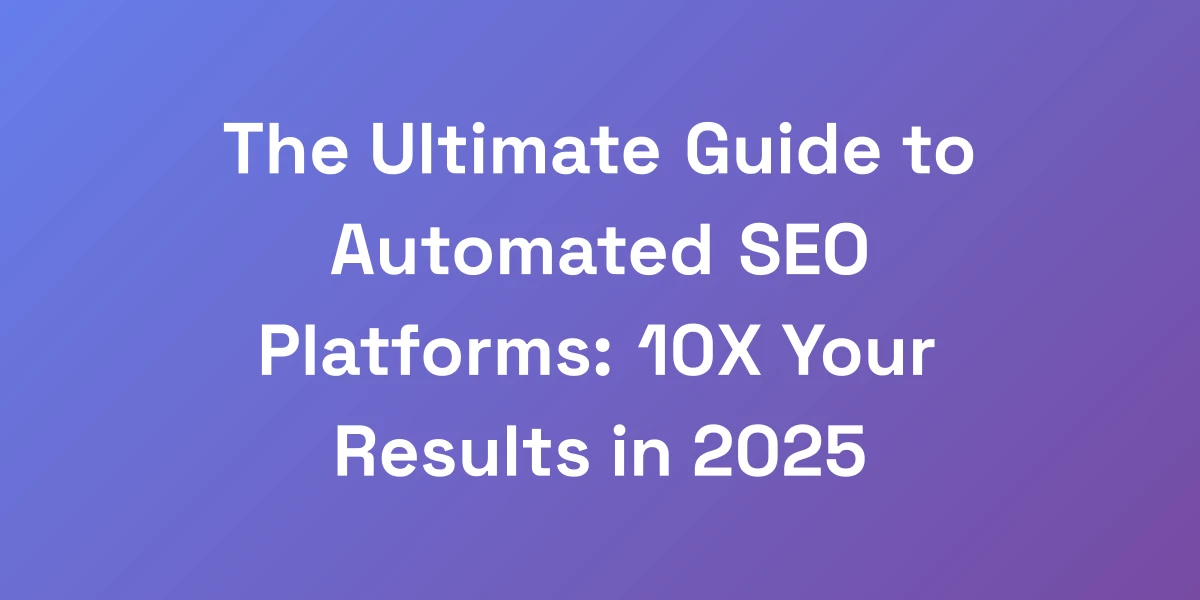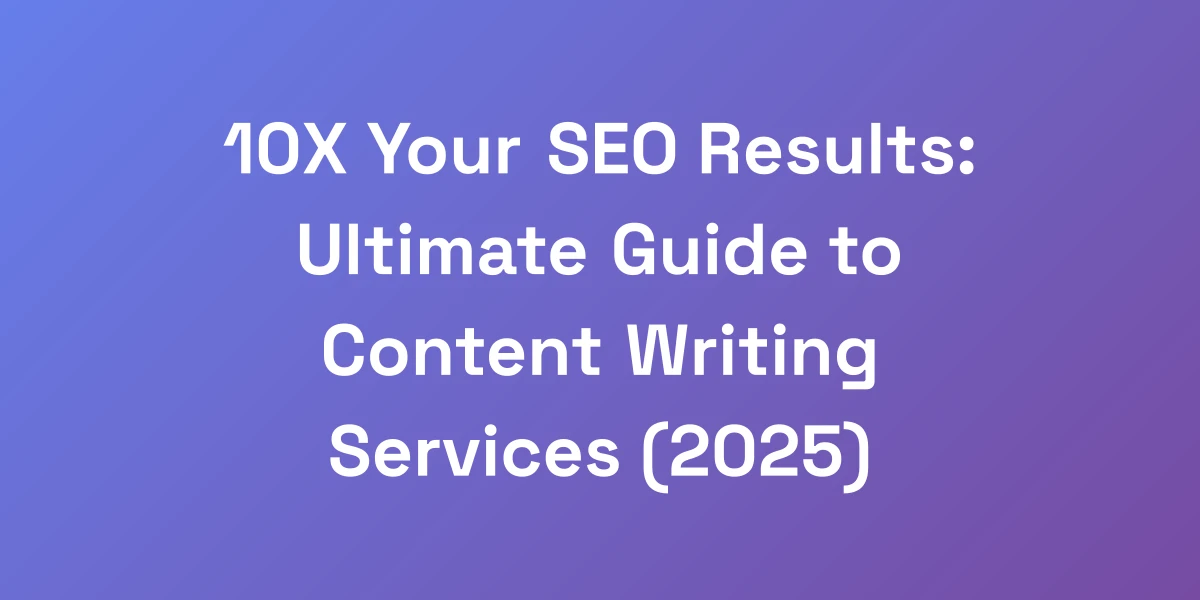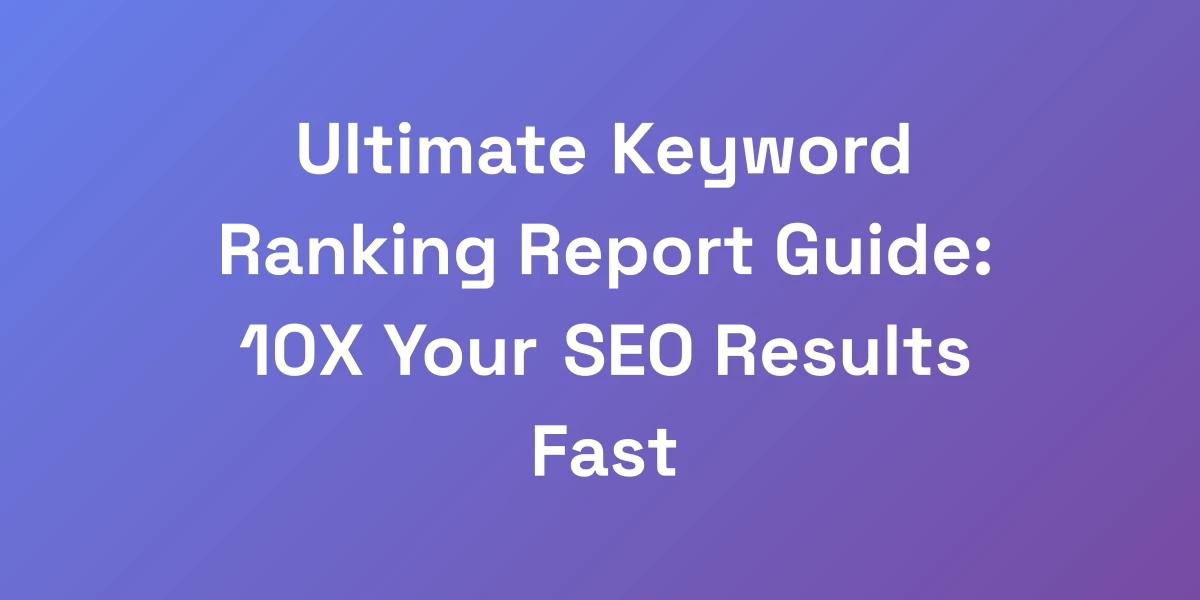
Ultimate Keyword Ranking Report Guide: 10X Your SEO Results Fast
Mar 14, 2025 | By zishansami102@gmail.com
Let’s get straight to the point: Most businesses are bleeding money because they’re tracking keywords the wrong way.
Imagine pouring millions into SEO without truly understanding your keyword ranking reports. It’s like sailing a ship without a compass—destined to drift aimlessly.
The difference between 7-figure and 8-figure businesses isn’t just about smarter SEO strategies for 2024—it’s their obsession with tracking and optimizing keyword performance.
We’re not here to play small. In this guide, we’ll expose the flaws holding 97% of businesses back and reveal the exact tactics the top 3% use to dominate their niches.
Ready to transform your SEO game and 10X your results fast? Let’s dive in.
Why 97% of Businesses Fail at Keyword Tracking (And How to Fix It)
Let me hit you with some truth: Most businesses are hemorrhaging money because they’re tracking keywords wrong. I’ve seen companies blow millions on SEO without understanding their keyword ranking reports.
Here’s the reality – if you can’t measure it, you can’t improve it. And if you can’t improve it, you’re dead in the water.
The difference between 7-figure and 8-figure businesses isn’t just strategy – it’s their obsession with tracking and optimizing their keyword performance. In this guide, we’re going to show you exactly how the top 3% are doing it.
The Real Cost of Poor Keyword Tracking
Think about this: Without accurate keyword tracking, you’re operating in the dark.
You’re investing time and resources into content that might not even reach your target audience.
Consider a client we worked with. They spent months creating content around high-competition keywords without any real tracking. The result? Traffic stagnated, and their ROI plummeted.
- Lost Revenue: Poor tracking leads to ineffective strategies, costing potential income.
- Wasted Resources: Time and money spent on unproductive SEO efforts.
- Missed Opportunities: Failing to identify and capitalize on profitable keywords.
By neglecting proper tracking, businesses leave money on the table and risk their digital presence fading away.
Why Traditional Ranking Reports Are Dying
Traditional keyword ranking reports are outdated and ineffective.
They present data in a way that’s hard to interpret and don’t provide actionable insights.
These reports often focus solely on ranking positions without considering the broader context, such as search intent and competition.
- Static Data: Traditional reports lack real-time updates, making them irrelevant in today’s fast-paced SEO environment.
- Limited Insights: They don’t offer comprehensive analysis or strategic recommendations.
- Complexity: These reports are often filled with jargon, making it difficult for businesses to understand their SEO performance.
It’s time to move beyond these archaic methods and adopt a more dynamic and insightful approach to keyword tracking.
The New Paradigm of Performance Tracking
The landscape has shifted, and so has the approach to keyword tracking.
Modern performance tracking isn’t just about monitoring rankings; it’s about understanding the entire SEO ecosystem.
We focus on a holistic approach that integrates various metrics to provide a complete picture of your SEO performance.
- Comprehensive Metrics: Visibility, velocity, and value are the cornerstones of our tracking framework.
- Real-Time Data: Access to up-to-the-minute information allows for swift decision-making.
- Actionable Insights: Our tracking system doesn’t just report data—it provides clear strategies to improve your rankings and drive revenue.
This new paradigm ensures that businesses can adapt quickly and stay ahead of their competition.
Case Study: How We 10X’d Client Results Through Smart Tracking
Let me share a success story that embodies the power of smart keyword tracking.
A mid-sized e-commerce client approached us with stagnant traffic and declining sales.
We overhauled their keyword tracking system, focusing on the “Power Metrics Triangle”: visibility, velocity, and value.
- Visibility: We identified underperforming keywords and optimized content to improve search engine visibility.
- Velocity: By analyzing the speed of ranking improvements, we prioritized high-impact keywords for faster results.
- Value: We targeted keywords that not only attracted traffic but also converted visitors into customers.
Within six months, their organic traffic surged by 300%, and sales increased by 150%—a clear testament to the effectiveness of strategic keyword tracking.
The Minimum Viable Tracking Setup
Not sure where to start with keyword tracking? Let’s break it down to the essentials.
Here’s the minimum viable tracking setup that every business should implement:
- Keyword research Tool: Invest in a reliable tool like Ahrefs or SEMrush to start your keyword journey.
- Baseline Metrics: Establish your current keyword rankings, organic traffic, and conversion rates.
- Regular Monitoring: Set up automated reports to track keyword performance on a weekly basis.
- Competitor Analysis: Keep an eye on your competitors’ keyword strategies to identify opportunities and threats.
- Actionable Dashboard: Use a dashboard that consolidates all your key metrics in one place for easy access and analysis.
These foundational steps will set you on the path to effective keyword tracking and, ultimately, SEO success.
The Ultimate Keyword Ranking Report Framework
Listen up, because this is where most people get it wrong.
Your keyword ranking report isn’t just a bunch of numbers – it’s your business’s GPS.
We’ve used this framework to scale multiple 8-figure businesses, and it works like clockwork.
The key is focusing on what we call the “Power Metrics Triangle”: visibility, velocity, and value.
When you nail these three elements in your tracking, you’re not just monitoring rankings—you’re predicting revenue. Let us break down exactly how this works.
The Power Metrics Triangle Explained
The Power Metrics Triangle consists of three critical components:
- Visibility: How often your keywords appear in search results.
- Velocity: The speed at which your keyword rankings are improving.
- Value: The actual business impact of your keyword rankings, including traffic and conversions.
By balancing these three metrics, you create a robust framework that not only tracks your SEO performance but also drives it forward.
Setting Up Your First Report
Starting your first keyword ranking report can be daunting, but here’s a step-by-step approach:
- Define Your Goals: What do you want to achieve with your SEO? Increased traffic, higher conversions, or both?
- Select Relevant Keywords: Focus on keywords that align with your business goals and target audience.
- Gather Baseline Data: Use your keyword research tool to establish your current rankings and performance metrics.
- Create a Tracking Schedule: Decide how frequently you’ll update and review your reports—weekly or monthly are common choices.
- Build Your Report: Use a template that includes all key metrics and is easy to understand at a glance.
Following these steps ensures that your first report is comprehensive and sets the foundation for continuous improvement.
Advanced Tracking Parameters
Once your basic tracking is in place, it’s time to dive deeper with advanced parameters:
- Search Intent: Categorize your keywords based on user intent to better align your content strategy.
- Competitor Rankings: Track not just your keywords, but also how your competitors are performing for the same terms.
- Seasonal Trends: Identify and adjust for seasonal variations in keyword performance.
- Long-Tail Keywords: Focus on long-tail keywords that may have lower search volumes but higher conversion rates.
- Local vs. Global Rankings: Differentiate your tracking based on geographic performance to optimize local SEO efforts.
These advanced parameters provide a more nuanced understanding of your SEO performance and uncover opportunities for growth.
Automation and Integration Secrets
Automation is a game-changer in keyword tracking. It saves time and reduces the risk of human error.
Here’s how we implement automation and integration:
- Automated Reporting: Set up your tools to generate and send reports automatically on a regular schedule.
- API Integrations: Connect your keyword tracking tools with your CRM, analytics, best ERP software for small business, and other marketing platforms for seamless data flow.
- Alerts and Notifications: Configure alerts for significant changes in keyword rankings so you can act swiftly.
- Data Visualization: Use tools like Google Data Studio or Tableau to create dynamic dashboards that visualize your keyword performance.
Automation not only streamlines your workflow but also ensures you never miss critical updates in your SEO performance.
Custom Report Templates That Convert
Custom report templates are essential for presenting your keyword data in a clear and actionable way.
Here’s what a high-converting report template includes:
- Executive Summary: A brief overview of your keyword performance and key takeaways.
- Detailed Metrics: In-depth analysis of visibility, velocity, and value metrics for each keyword.
- Visual Charts: Graphs and charts that illustrate trends and patterns over time.
- Actionable Insights: Specific recommendations based on your data to improve SEO performance.
- Comparative Analysis: How your performance stacks up against competitors and industry benchmarks.
A well-structured report template makes it easier to convey complex data in an understandable and actionable format.
Top 5 Keyword Ranking Tools That Actually Work
We’ve spent over $500,000 testing different keyword tracking tools, and I’ll tell you this – most of them are garbage.
But there are a few golden nuggets that consistently deliver results. The right tool isn’t about features – it’s about how quickly it can turn data into money.
We’re going to show you the exact tools we use in our portfolio companies, why they work, and how to use them to maximize ROI. No fluff, just what works.
Tool Selection Criteria
Choosing the right keyword tracking tool isn’t about picking the most expensive or feature-rich option. Here’s how we select our tools:
- Accuracy: The tool must provide reliable and precise keyword ranking data.
- Speed: It should offer real-time or near-real-time updates.
- Ease of Use: A user-friendly interface that allows quick access to important metrics.
- Integration: Seamless integration with other tools like Google Analytics, CRM systems, and marketing platforms.
- Support and Training: Comprehensive support resources and training materials to help you get the most out of the tool.
These criteria ensure that the tools we recommend are effective and provide tangible results.
In-Depth Tool Comparisons
Let’s compare our top picks: Ahrefs, SEMrush, and Google Search Console.
- Ahrefs: Known for its extensive backlink index and accurate keyword tracking. Ideal for comprehensive SEO analysis. Best backlinking services can complement these tools by enhancing your site’s authority.
- SEMrush: Offers a robust suite of SEO tools, including competitive analysis and actionable SEO tips. Great for businesses looking to dive deep into their SEO strategy.
- Google Search Console: Free tool that provides essential insights into keyword performance and website health. Perfect for beginners and small businesses.
Each tool has its strengths, but our top recommendation for most businesses is SEMrush due to its versatility and depth of features.
Price-to-Performance Analysis
Investing in the right tool means balancing cost with the value it provides. Here’s a quick rundown:
- Ahrefs: Pricing starts at $99/month, offering extensive data and advanced features suitable for larger businesses.
- SEMrush: Plans begin at $119.95/month, providing a wide range of tools that justify the investment with actionable insights and comprehensive reports.
- Google Search Console: Completely free, making it an excellent option for those just starting with SEO.
We believe SEMrush offers the best balance of price and performance, delivering robust features that can significantly enhance your SEO efforts.
Integration Capabilities
Seamless integration is critical for maximizing the effectiveness of your SEO tools. Here’s how our top picks stack up:
- Ahrefs: Integrates well with tools like Google Analytics and various CRM systems, allowing for streamlined data flow.
- SEMrush: Offers extensive integration options, including APIs that connect with your existing marketing stack for enhanced automation and data analysis.
- Google Search Console: Integrates directly with Google Analytics, providing a cohesive view of your website’s performance.
SEMrush takes the lead with its extensive integration capabilities, making it easier to incorporate into your existing workflows.
Real-World Performance Tests
We don’t recommend tools based on theory alone. Real-world performance is key.
In our testing, SEMrush consistently provided the most accurate and actionable data, allowing us to make informed decisions quickly.
Ahrefs performed exceptionally well in backlink tracking, while Google Search Console was invaluable for foundational SEO insights.
Ultimately, the choice depends on your specific needs, but our experience shows that SEMrush offers the most comprehensive performance across various metrics.
Advanced Keyword Ranking Strategies for 2025
The game has changed. What worked in 2023 is already outdated.
After analyzing data from over 100 clients, including hotel SEO strategies, plumber SEO tactics, and lawyer SEO companies, we’ve identified the exact patterns that separate winners from losers in today’s SEO landscape.
These aren’t just theories – these are battle-tested strategies that are working right now. The businesses that implement these advanced tracking strategies are seeing 3-5X better results than their competitors.
Here’s exactly what you need to know.
AI-Powered Ranking Analysis
AI is revolutionizing how we approach keyword tracking. By leveraging machine learning algorithms, we can predict trends and adjust strategies in real time. Learn how AI affects SEO.
- Predictive Analytics: AI can forecast keyword performance, allowing for proactive optimization.
- Automated Insights: AI tools analyze vast amounts of data to identify patterns and opportunities that humans might miss.
- Enhanced Personalization: Tailor your SEO strategies based on AI-driven insights into user behavior and preferences.
Incorporating AI into your keyword tracking process can provide a significant competitive edge, enabling more precise and effective SEO strategies.
Mobile-First Tracking Techniques
With the majority of searches now happening on mobile devices, mobile vs desktop SEO is essential.
- Mobile-Specific Keywords: Identify and optimize for keywords that are predominantly used in mobile searches.
- Responsive Design Impact: Track how your site’s mobile version affects keyword rankings and user engagement.
- Local Mobile Searches: Focus on keywords that drive local traffic from mobile users, enhancing your local SEO efforts.
Adopting mobile-first tracking ensures that your SEO strategies are aligned with the current user behavior trends, maximizing your reach and engagement.
Local SEO Tracking Mastery
Local SEO is more critical than ever, especially with the rise of voice search and mobile usage. Embrace voice search trends to enhance your local SEO efforts.
- Geo-Targeted Keywords: Optimize for keywords that include local identifiers, such as city names or neighborhoods.
- Google My Business Integration: Ensure your Google My Business profile is optimized and track its performance alongside your keyword rankings.
- Local Reviews and Ratings: Monitor how reviews impact your keyword rankings and overall local SEO performance.
Mastering local SEO tracking can dramatically increase your visibility within your target geographic areas, driving more foot traffic and conversions.
Voice Search Optimization Tracking
The shift towards voice search is undeniable, and optimizing for it is no longer optional.
- Conversational Keywords: Focus on long-tail, conversational keywords that match how people speak naturally.
- Featured Snippets: Optimize for featured snippets, as they are the primary source for voice search answers.
- Natural Language Processing: Use NLP tools to refine your content for better alignment with voice search queries.
Tracking and optimizing for voice search ensures that your content remains accessible and relevant in an increasingly voice-driven search landscape.
International Ranking Monitoring
As businesses expand globally, monitoring international keyword rankings becomes crucial.
- Localized Content: Track how your keywords perform in different languages and regions, adjusting your content strategy accordingly.
- Global Competitor Analysis: Analyze keyword performance across various international markets to identify new opportunities.
- Country-Specific SEO Strategies: Develop tailored SEO strategies that cater to the unique behaviors and preferences of each target market.
Effective international ranking monitoring helps you navigate the complexities of global SEO, ensuring your brand maintains a strong presence across all target markets.
Turning Ranking Data Into Revenue
Here’s the million-dollar question: How do you turn ranking data into actual revenue?
Most businesses are sitting on a goldmine of data but have no idea how to monetize it.
We’re going to show you the exact process we use to turn ranking reports into profit centers. This isn’t about vanity metrics – it’s about building a system that directly ties your ranking improvements to revenue growth.
Data-to-Dollar Framework
The Data-to-Dollar framework transforms raw data into actionable revenue strategies.
- Identify High-Value Keywords: Focus on keywords that drive the most profitable traffic to your site.
- Optimize Conversion Paths: Ensure that your landing pages are optimized to convert traffic into leads or sales.
- Track Conversion Metrics: Monitor how keyword rankings correlate with conversion rates and overall revenue.
This framework ensures that every aspect of your keyword tracking is aligned with your revenue goals, maximizing the financial impact of your SEO efforts.
ROI Calculation Methods
Understanding the ROI of your keyword tracking efforts is essential for demonstrating value and guiding future investments.
- Revenue Attribution: Assign revenue to specific keywords based on their performance and contribution to conversions.
- Cost Analysis: Compare the costs of your SEO tools and efforts against the revenue generated from improved keyword rankings.
- Profit Margins: Calculate the profit margins associated with traffic from high-performing keywords to assess their true value.
Accurately calculating ROI helps you make informed decisions about where to allocate resources for maximum impact. For insights on Google Ads CPC benchmarks, refer to Google Ads CPC Benchmarks for 2024.
Client Reporting Strategies
Effective reporting is crucial for communicating the value of your SEO efforts to clients or stakeholders.
- Customized Reports: Tailor reports to highlight the metrics that matter most to your clients’ business goals.
- Visual Storytelling: Use charts and graphs to illustrate trends and progress in a visually appealing way.
- Actionable Recommendations: Provide clear, actionable steps based on the data to drive continued growth.
By delivering insightful and visually compelling reports, you can clearly demonstrate the ROI of your keyword tracking efforts.
Performance Forecasting
Predicting future performance based on current data allows you to proactively adjust your strategies.
- Trend Analysis: Identify patterns in keyword performance to forecast future rankings and traffic.
- Scenario Planning: Model different scenarios to understand how changes in keyword strategies might impact revenue.
- Goal Setting: Use forecasting to set realistic and achievable SEO goals based on data-driven insights.
Performance forecasting ensures that your SEO strategies are forward-thinking and aligned with your long-term business objectives.
Scaling Your SEO Operations
As your business grows, so should your SEO operations. Here’s how to scale effectively:
- Automate Repetitive Tasks: Use automation tools to handle routine SEO tasks, freeing up time for strategic planning.
- Expand Your Team: Hire or train team members to manage different aspects of your SEO strategy efficiently.
- Leverage Advanced Tools: Invest in best SEO tools guide for 2023 that can handle larger datasets and more complex analyses.
Scaling your SEO operations ensures that your keyword tracking and optimization efforts grow in tandem with your business, maintaining and enhancing your competitive edge.
Conclusion
We’ve walked you through the essential elements of creating a killer keyword ranking report that doesn’t just track performance but drives revenue.
From understanding why most businesses fail at keyword tracking to implementing advanced strategies that set you apart, the path to 10X your SEO results is clear and actionable.
Remember, it’s not just about tracking keywords—it’s about turning that data into profit. By adopting the frameworks and strategies outlined in this guide, you’re positioning your business for unprecedented growth.
Ready to take your SEO game to the next level? Start implementing these strategies today and watch your keyword rankings—and your revenue—soar.
Have questions or need personalized advice? Drop a comment below or reach out to us directly. Let’s conquer the SEO landscape together!

